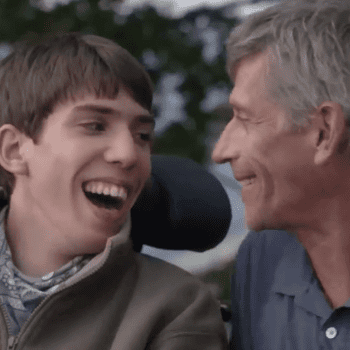
Planes, Trains and Automobiles has been described as the quintessential Thanksgiving movie, even though the turkey barely gets five seconds of screentime.
Perhaps it owes its enduring appeal to the very fact that it flips the holiday movie formula on its head. Neal Page wants very much to be home with his family, yet he spends all but the last few minutes of the movie with a complete stranger. Glimpses of the homecoming feast are held out as a tease in his imagination, but the Norman Rockwell image of family gathering around it is left to ours. Like Neal, we, the viewers, are out of our element. Nonetheless, the lessons we learn with him are surprisingly profound.
In keeping with road movies in general and 80s road movies in particular, the story introduces us to an abrasive main character who gradually softens under the influence of a patience-testing but lovable companion. But in fairness to Neal, whose patience wouldn’t be tried by Del Griffith, the motor-mouthed shower curtain ring salesman who leaves his socks in the sink, makes ghastly snorting noises to clear his sinuses at night, and seems incapable of wrapping up his interminable stories with a point? Yet, in his quest to beat the weather and make it home, Neil finds himself repeatedly, humiliatingly dependent upon the kindness of this stranger.
Neal’s predicament is that of the man in The Brothers Karamazov, who reflects:
The more I love humanity in general the less I love man in particular. In my dreams, I often make plans for the service of humanity, and perhaps I might actually face crucifixion if it were suddenly necessary. Yet I am incapable of living in the same room with anyone for two days together. I know from experience. As soon as anyone is near me, his personality disturbs me and restricts my freedom. In twenty-four hours I begin to hate the best of men: one because he’s too long over his dinner, another because he has a cold and keeps on blowing his nose. I become hostile to people the moment they come close to me. But it has always happened that the more I hate men individually the more I love humanity.
We all hope we wouldn’t lash out at Del as cruelly as Neal does in that famous early scene. But for me, Neal’s seething resentment still strikes uncomfortably close to home, as did Dostoevsky’s words when I first read them. Polite society teaches us to dread the curse of being Del Griffith, when we should dread much more the curse of being Neal Page.
But if the truth were told, how many of us have been both Del Griffith and Neal Page at different times? This is the beauty of their story. We look in the mirror and cringe at what we see, but we learn to love the reflection anyway.
Thankfully, like the rest of us, Neal is not beyond redemption. Midway through, he and Del take separate seats on a train, thinking they’ve seen the last of each other. But of course, it breaks down on the tracks, leaving its passengers to strike out for new transportation. When Neal notices Del dragging his inexplicably large trunk across the frozen ground, he walks over and takes up the other end, recoupling his fate to Del’s once more. In his heart, he knows it’s the right thing to do, the human thing to do.
In the end, after many more misadventures, Neal finally bids farewell to Del and boards his last train home. Here, he could choose to rest content, a new friend made, a lesson learned.
But, as we know, he can’t. Something doesn’t add up. Del said he had a wife who “likes me,” but this doesn’t square with his stray comment that he “hasn’t been home in years,” hastily explained as an exaggeration of a traveling salesman’s lifestyle. Then there was the look on Del’s face when Neal toasted him over a round of drinks in a sleazy motel room by saying, “Well, at the very least, you have a beautiful wife to go home to.”
Revelation dawns. Neal bolts out of the train at the next stop to go back and find Del, sitting at the station with nowhere to go. There he finally gets the truth: Del’s wife has been dead for years, and she seems to have been all the family he’s got. He has no friends and no plans. He got Neal to Chicago purely for Neal’s sake, and because having a jerk to talk to for a couple days was better than having nobody to talk to at all.
Cynics will say the final scene where Neal welcomes Del into his own home for Thanksgiving is a pointless token gesture that will leave no lasting impact on Del’s life. But this certainly does not seem to be how John Hughes intended it. While John Candy’s last look beautifully conveys both gratitude and a lingering, bittersweet sadness, we are not meant to take away that the misadventures of Neal and Del have all been for nothing. Del may not have found a permanent adoptive family, but he’s found a friend.
It’s not hard to find Del Griffith, if you allow yourself to see him. It might be harder to extend grace to him. Planes, Trains & Automobiles encourages us to try in spite of ourselves. And it reminds us that even as we extend grace, we just might be the ones who need it most.
This article originally appeared at The Stream.













